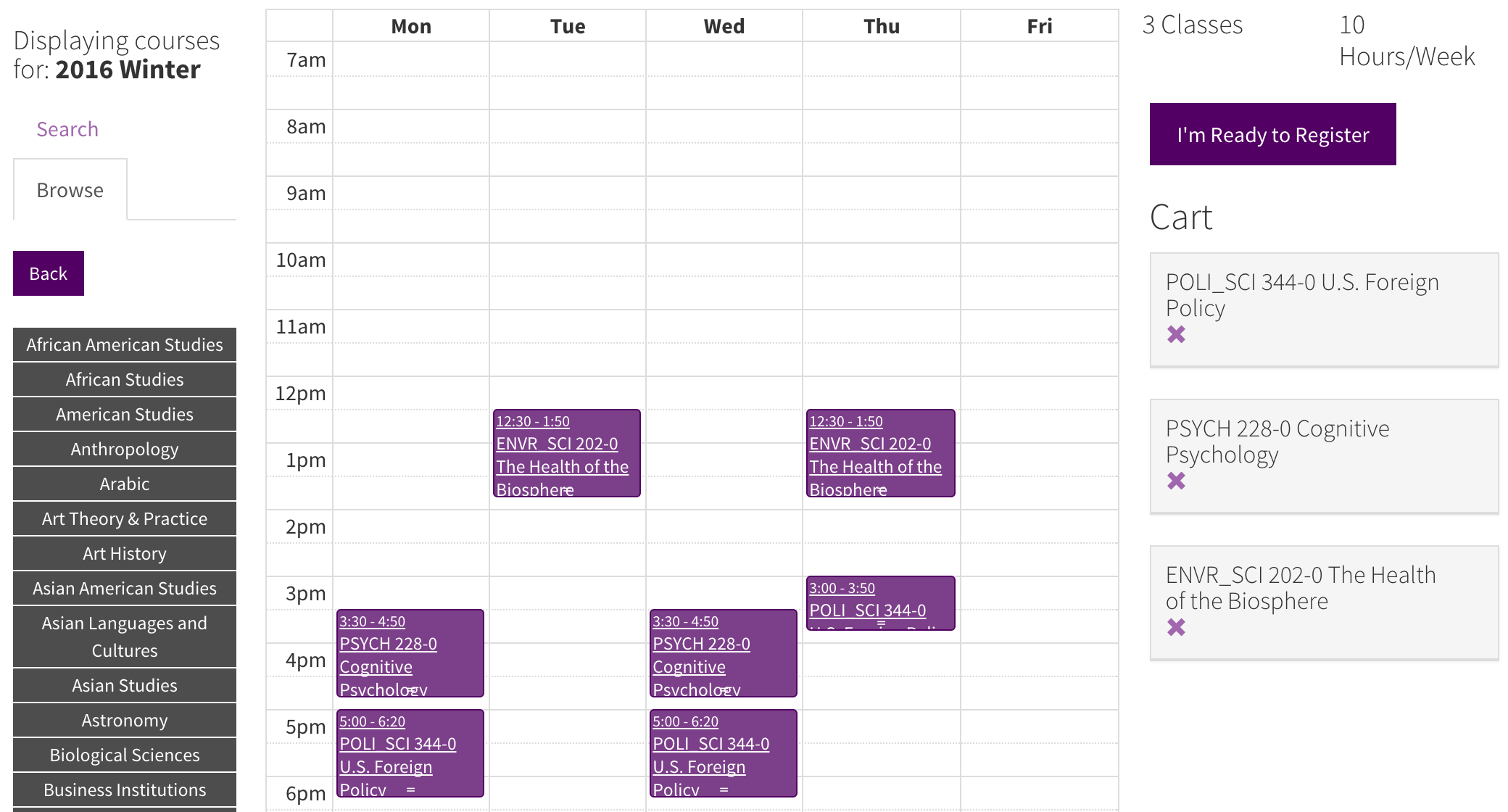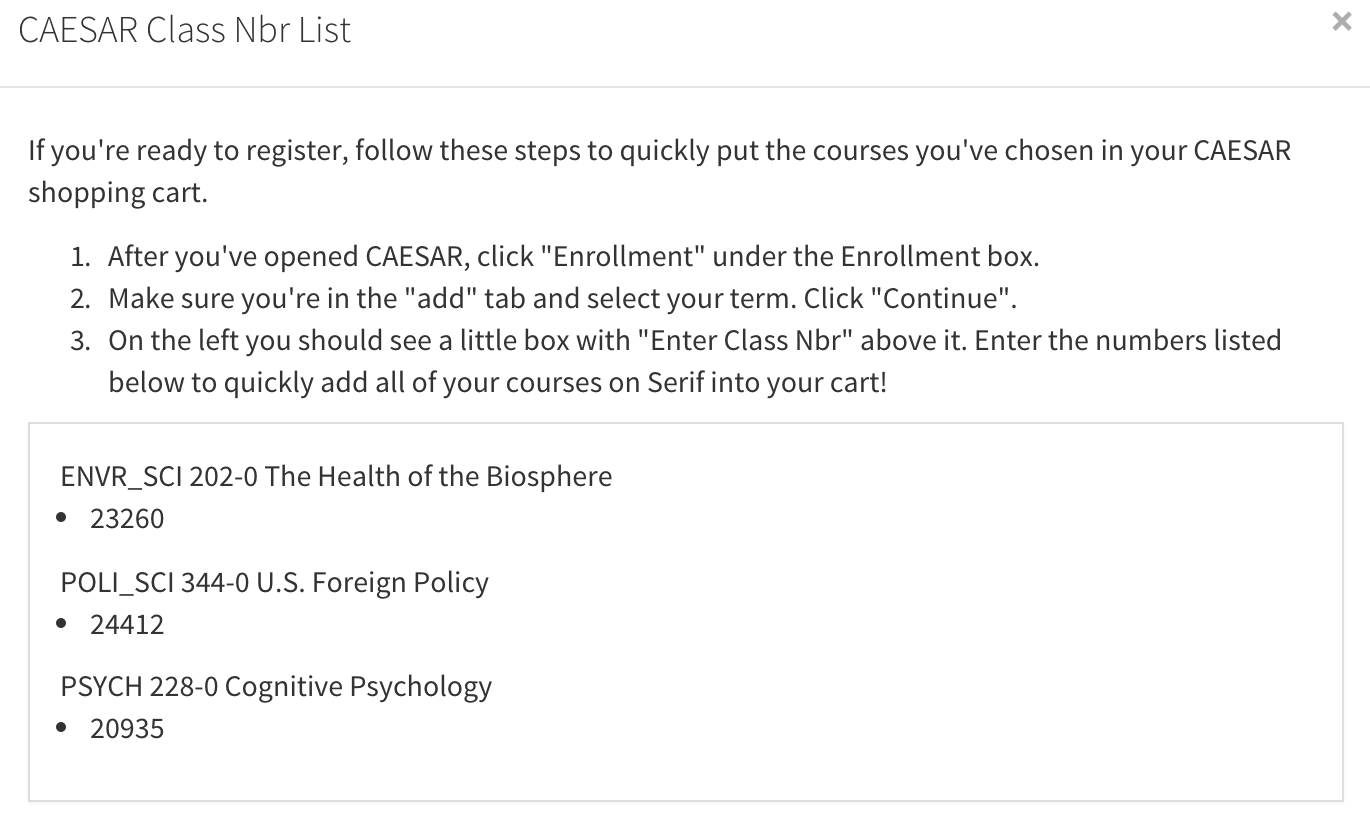
Joon Park knows course registration can be a headache. When he came to Northwestern, Park was frustrated by Caesar's lack of a weekly calendar view for planning courses. For students with late registration times who must plan alternate schedules in anticipation of a class filling up, registering gets complicated.
Visually-oriented people can draw mock schedules by hand or create new Excel spreadsheets each quarter. But Park – now a junior pursuing a dual degree in music composition and physics and astronomy – thought he could do better. Starting near the beginning of Fall Quarter, Park began devoting hours each night to creating Serif, which he calls a “visual shopping cart” to simplify planning for course registration.
“It's been a crazy blur this past quarter," Park said. “I got this idea as more of a, 'Oh, I can do this' kind of moment during the first couple weeks this quarter, and ever since then it's been a ton of hours and staying up late every night.”
Park designed Serif to complement Caesar, which only provides a weekly calendar view of your schedule after enrollment. Park calls himself a visual person (“I use my Google calendar for everything,” he said), and after learning of an ASG initiative allowing students to download course data from the registrar’s office, he came up with the idea to make a webpage for himself to plan out courses with a weekly calendar view.
“As I started doing it more and more and learned more about the code and everything, I realized, 'Hey, maybe other people want to use this too,’” Park said. “A lot of my friends who I was telling about [the app] said this is a really good idea, you should keep working on this.”
Serif is not the first app that seeks to combat Caesar's inefficiency. In May 2013, seven students launched Courseseek, a website that provided the same function but has since shut down. And Romaine, developed by a team of four Knight Lab students, lets users see classes their friends are interested in or registered for through Facebook integration.
But Serif doesn’t do everything. Park designed his app to work with Caesar, not replace it.
“I'm hoping this is something people go to first when they're trying to plan out courses," Park said. "And then when they're ready to register, they can go to Caesar. And then maybe if they see that some [classes] are getting filled up, if they have a late registration time, they can use [Serif] to fix things.”
On the left side of the Serif homepage, a drop-down menu contains every course listed for the upcoming quarter. Clicking on a course adds it to the weekly calendar view in the middle of the page, and a “cart” on the far right lets you remove courses in one click.
“Right now, it's usable, it's fast, it's simple, but I want it to be more intuitive,” Park said. “And not only more intuitive, but really just easy for the user to not have to do a lot of work.”
Park recently added an “I’m Ready to Register” button on the homepage, which takes you to a window with instructions for how to enroll in your classes on Caesar. Serif lists the registration numbers that correspond to the classes you want to sign up for, which you then can enter on Caesar to instantly find your course.

Serif still lacks some important functions, which Park is developing for future use, including the ability to browse courses from terms other than the upcoming one. To switch discussion sections, Serif users must also remove the course from their cart and re-add it with the new section time. And Park hopes to implement a login functionality to allow users to access schedules across their computers and phones or tablets.
"When I write a piece of music, I never think it's ever finished," Park said. "And I think it's the same with this, where... if you see my to-do list of things to improve, it's giants. It's two pages of things that I can improve on. Especially because all my friends who helped me beta test and fix bugs, they always say, 'This could be better' – which is great!"
But why does Park devote hours each night to Serif, which doesn’t earn him any money? Is the time spent adding new features to save users just seconds of registration time actually worth it?
“What really keeps me going is, one, it's a lot of fun – I really enjoy coding, to keep adding new features and learn a lot of new stuff,” Park said. “But also a lot of people have come up to me after the initial release saying, 'Oh my god, I needed this.' People are coming up and thanking me, and I thought that was super rewarding. That just makes me want to make this better and make it the best possible.”